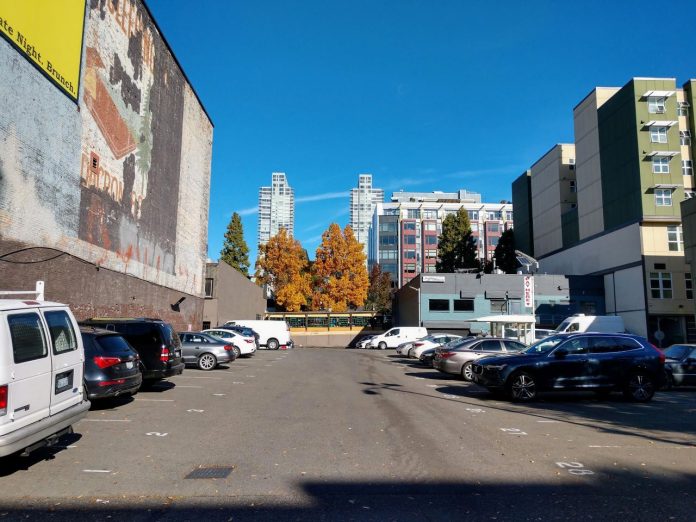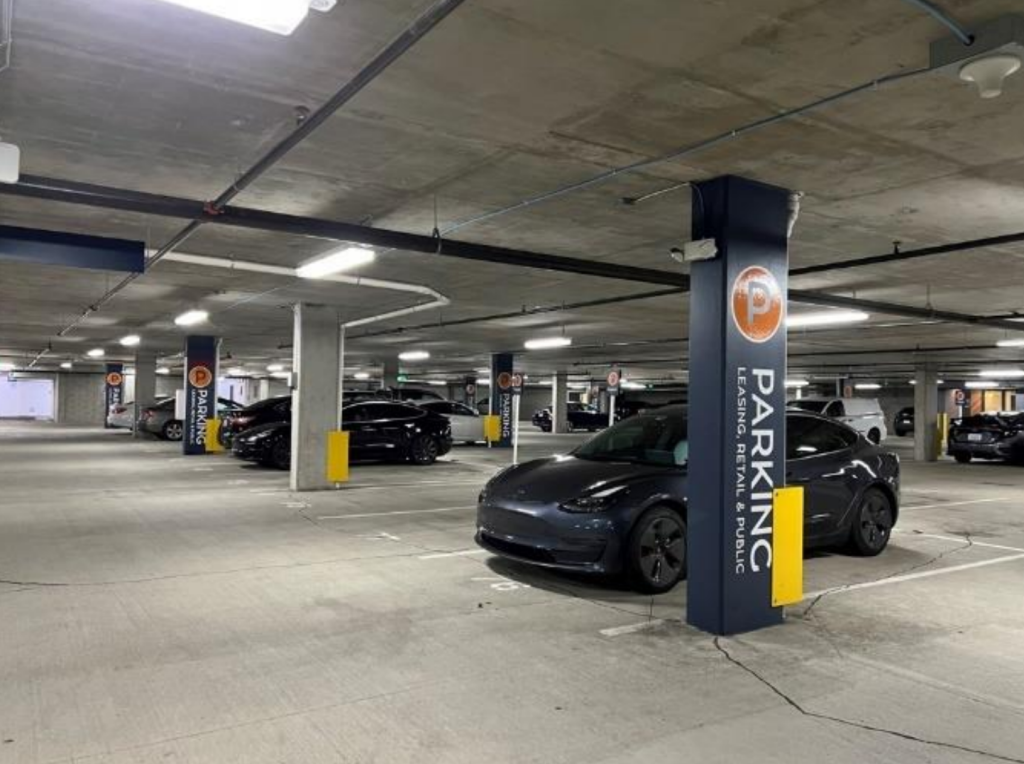
By a 40-8 vote Wednesday, the Washington State Senate approved a comprehensive overhaul limiting the ability of local counties and medium- and large-sized cities to require off-street parking in new development. The final passage of Senate Bill 5184, sponsored by Senator Jessica Bateman (D-22nd, Olympia), represents a seismic shift when it comes to parking reform in Washington. It is one of the most robust parking reform packages to move forward in any state.
SB 5184 would cap the minimum parking requirements that cities and counties impose on new development to 0.5 per unit, so a 100-unit apartment building couldn’t be required to include more than 50 stalls — though developers could build more than that in almost all cases, if they so choose. Parking requirements paired with new commercial spaces would be capped at one stall per 1,000 square feet. Furthermore, parking could not be required as a condition of allowing a broad array of specific types of development, including with mixed-use commercial spaces, smaller apartments, housing for seniors or disabled people, or bars and restaurants that serve alcohol.
Ahead of the final vote, the Senate rejected a slew of amendments that would have watered down the bill’s key provisions, including one amendment that would have changed the bill to apply only to Seattle, Spokane, and Tacoma. Spokane already eliminated parking requirements at the city level in 2024.
However, senators adopted one amendment exempting cities with fewer than 20,000 residents, a move that means some cities will be left off the hook and allowed to retain high parking mandates.
Around 60% of Washingtonians live in cities above that 20,000 threshold, and SB 5184 is likely to be very impactful in the state’s most urban areas, including Seattle, where city leaders have been reluctant to build on successful steps toward parking reform made in the past decade. Seattle has lifted parking mandates on new housing in its designated urban centers and frequent transit areas, but they remain in place in lower-density neighborhoods.
With that 20,000 threshold, cities ranging in size from Mukilteo and Mercer Island, to Olympia and Walla Walla, all the way up to Tacoma and Everett would be covered by the bill.
According to the Sightline Institute, a Pacific Northwest housing-focused think tank, adding parking in a surface lot can cost builders $20,000 per stall, and can cost $60,000 per stall or more in an underground garage. Those costs are directly passed along to future residents, and often translate to lost space that could be used for additional units or resident amenities, like courtyards and green space.
“The way that we regulate parking in the United States is getting in the way of our ability to create the things that we also need, which is housing, small businesses, [and] creating livable, walkable communities,” Bateman said Wednesday. “What this bill does is it simply gives developers and builders the tools and the flexibility to right-size their parking for the project that they’re actually working on. We know that there are some places where it makes sense to have a lot of parking, and then there are other times when it’s not necessary, and it would be counterproductive.”

Just two years ago, a bill removing parking mandates near transit wasn’t even able to reach the House floor, but the conversation around parking reform has advanced by leaps and bounds since that time. Major cities in every corner of the state, including Port Townsend, Spokane, Bellingham and Shoreline, have all either fully removed parking mandates or taken steps toward doing so.
The bill has been facing significant push back from local governments, wary of giving up what many see as an essential tool to manage their transportation networks. The Association of Washington Cities (AWC) included SB 5184 on a list of bills that it recommended “do not advance,” and on Tuesday, sent an email alert to its members asking them to contact senators to request significant revisions to the bill.
“This bill is one-size-fits all. This might work in some cities where transit is widely available and families aren’t as reliant on vehicles, but not in all communities,” the AWC email stated. “City residents should have a say in how to address real impacts of development on their daily lives. This silences their voices by removing those decisions from the leaders they elected and puts these decisions in the hands of private for-profit developers.”
Parking reform advocates argue that the arbitrary standards imposed by cities are actually the one-size-fits-all mandates, with extreme requirements in place across the state for a variety of niche uses. In Port Angeles, for example, a laundromat is required to have a parking space for every washing machine, and an automobile dealership is required to have two parking stalls for everyone one employee on staff. Many of these guidelines come from the widely discredited trip generation manual created by the Institute of Transportation Engineers (ITE), which often extrapolates based on an incredibly small sample size of real life examples.
With a 40-8 vote, Bateman’s bill saw significant support from the other side of the aisle.
“We all know that we have a housing shortage, and what we’re really trying to do is create opportunities for more housing units to be built,” Senator Keith Goehner (R-12th, Leavenworth) said. “I think that what we are really trying to do, realizing that we’ve dug ourselves a pretty deep hole, and with our housing situation, we really are trying to create opportunities for us to do some — when I say, catch up, I don’t even think that’s the appropriate term — but at least to stimulate or incentivize more more housing.”
Just two Democrats voted against Bateman’s bill — Senator Steve Conway (D-29th, Tacoma) and Bob Hasegawa (D-11th, Seattle), two members known for their contrarian streak on housing issues.
Now the bill moves onto the state House, where it is well-positioned to move forward. SB 5184’s companion bill in that chamber, HB 1299, won’t move forward, but had been sponsored by the chair of the House housing committee, Rep. Strom Peterson (D-22, Edmonds), along with nine other legislators.
“We are desperately trying to address the issue of creating more housing in Washington State, and passing this bill will enable us to build more housing,” Bateman said at final passage. “It will help us support our local businesses and our local entrepreneurs, and it will help us create more livable, walkable communities.”
Ryan Packer has been writing for The Urbanist since 2015, and currently reports full-time as Contributing Editor. Their beats are transportation, land use, public space, traffic safety, and obscure community meetings. Packer has also reported for other regional outlets including BikePortland, Seattle Met, and PubliCola. They live in the Capitol Hill neighborhood of Seattle.

